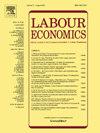初级医生的专业选择:十多年来陈述和显示的偏好
IF 2.6
2区 经济学
Q2 ECONOMICS
引用次数: 0
摘要
在许多国家,一个重要的卫生政策问题是医疗人员的过度专业化。了解初级医生对替代专业特征的偏好对于制定政策以改善医生跨专业分布至关重要。本文通过对初级医生的陈述偏好离散选择实验(DCE)估计了个人对替代专业特征的偏好,然后在接下来的12年里对来自DCE的初级医生进行了跟踪调查,比较了他们的实际劳动力市场结果与他们的估计偏好。我们的研究结果表明,五年后,对高收入的更强烈偏好与选择专科医生而不是全科医生的轨迹有关,但这种影响在12年后变小了,而且在统计上不显著。专业的非金钱内在属性,特别是那些反映使用人力资本能力和技能的能力(例如学术机会或执行程序性工作的能力)是长期专业选择的更持久的预测因素。虽然全科医生和专科医生之间的收入差距在短期内似乎会影响选择,但从长期来看,这可能不太相关,因为基于能力和技能的专业匹配发挥了更持久的作用。本文章由计算机程序翻译,如有差异,请以英文原文为准。
Junior doctors’ specialty choice: Stated and revealed preferences over more than a decade
An important health policy issue in many countries is the over-specialisation of the medical workforce. Understanding junior doctors’ preferences over characteristics of alternative specialties is crucial in designing policies to improve the distribution of doctors across specialties. This paper estimates individual-level preferences over characteristics of alternative specialties from a stated-preference discrete-choice experiment (DCE) of junior doctors, then follows up the junior doctors from the DCE over the following twelve years to compare their actual labour market outcomes with their estimated preferences. Our results show that stronger preferences for higher earnings are associated with choosing the specialist rather than the general practice track after five years but this effect is smaller and not statistically significant after 12 years. Non-pecuniary intrinsic attributes of specialties, specifically those reflecting the ability to use human capital abilities and skills (e.g. academic opportunities or the ability to perform procedural work) are more enduring predictors of specialty choice over the long term. While the gap in earnings between general practitioners and specialists appears to impact on choices in the short term, this may be less relevant in the long term where matching to specialties based on abilities and skills play a more persistent role.
求助全文
通过发布文献求助,成功后即可免费获取论文全文。
去求助
来源期刊

Labour Economics
ECONOMICS-
CiteScore
3.60
自引率
8.30%
发文量
142
期刊介绍:
Labour Economics is devoted to publishing research in the field of labour economics both on the microeconomic and on the macroeconomic level, in a balanced mix of theory, empirical testing and policy applications. It gives due recognition to analysis and explanation of institutional arrangements of national labour markets and the impact of these institutions on labour market outcomes.
 求助内容:
求助内容: 应助结果提醒方式:
应助结果提醒方式:


